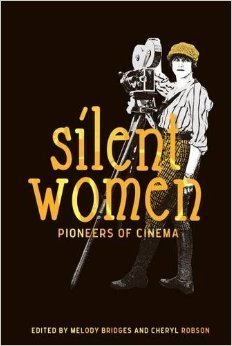The program extends its congratulations to CS student Aimee Dixon Anthony who has contributed a chapter to Silent Women: Pioneers of Cinema. Her chapter “Early African-American Female Filmmakers” explores the roles of African American women filmmakers in silent cinema. Read the interview Esma H. Celebioglu has conducted with Aimee about her publication.
Your book chapter is about African American female filmmakers in silent cinema. The topic draws our attention to a crucial issue that is mostly ignored by historians and still significant today. Can you expand on that?
What makes the focus of the history of African American women filmmakers in silent cinema so significant is that there is virtually no recorded scholarship on this history. There is burgeoning work on this topic and a growing interest in African American filmmakers both in past history and future history. But while there may be no "books" per se on this topic, there must have been women who made films well before the 1970s and Julie Dash. In fact, what I have learned from my research and the writings is that these women do exist. There was an interest and production of films by African American women as early as 1905. As an African American female filmmaker myself, it is important for me to know of these women and to learn of why they made films and how they made them in an industry that has come to be shaped predominantly by white male filmmakers. It is hard enough to be a female filmmaker in 2016. Imagine what it would be like to be a black female filmmaker at the turn of the century.... Or was it as hard given the nascent nature of the industry? That is what fascinates me.
In this article you address a doubled oppression…Being African American and being a woman in an industry dominated by men. Making a historical connection, what can we say about the roles of African American women in shaping cinema industry?
As I touched upon earlier, it must have been especially difficult to pursue filmmaking in a time when gender and race created boundaries and hurdles that were almost impossible to overcome. And while there were women who were quite successful in the early years of film as the industry became more and more successful those roles dissipated and women were put into gendered positions within the film business. How African American women helped to shape the cinema industry still remains to be seen. I would argue that they were not given the opportunity to shape the industry. But, perhaps, with more scholarship and knowledge of these women in early film it can help to change the future and inspire young women of color to believe in their dreams of working in the film industry knowing there were women before them who made an imprint.
What do you think about the relation of cinema and social change? Do you think it has a transformative power in contemporary world?
Absolutely. Whether we want to believe it or not, cinema can have a powerful impact and effect on our world. For one it is a powerful medium that can, in an instant, travel the globe and be seen by people of all types of races, genders, ages, classes. As we witness through politics, media has a dynamic effect, both positive and negative, in shaping and controlling how we see and are informed about the world. Because of its power it is extremely important that it be a democratic production. What I mean by that is: that people from all genders, ethnicities, social classes, parts of the globe be given a chance to produce films that give us insight into a variety of voices--not one monolithic point of view. Films can shape our knowledge so our knowledge must be broad so that we have to power to make informed decisions about our world.
Do you have any future projects on this topic?
I plan to continue my dissertation work on the same topic of African American women in silent film from the 1890s to the 1940s hoping to publish a book on it. That is such an important space to work within film scholarship that I feel it deserves most of my attention. However, I also hope to develop and publish a piece on 12 Years a Slave and temporality.
June 27, 2016

